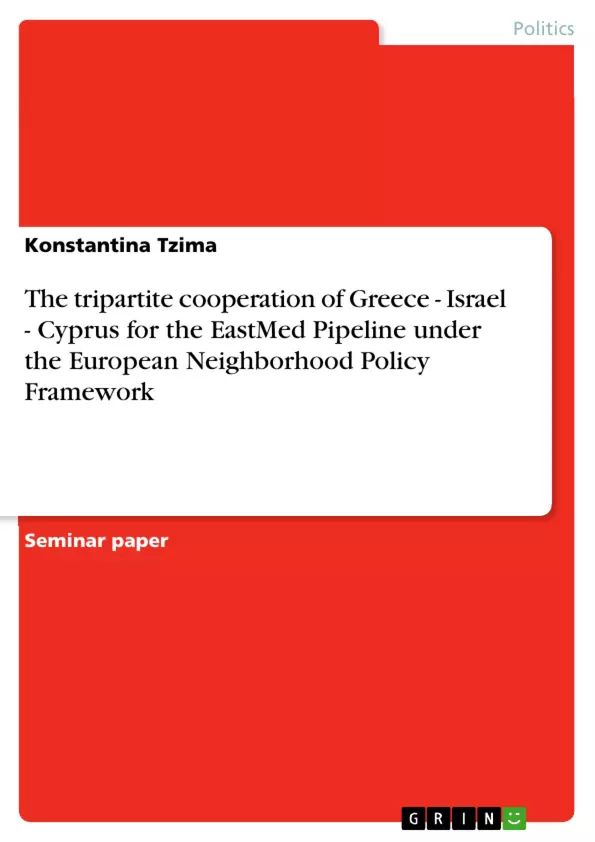In this paper the aim is to analyze that environment from the energy perspective, and to be more specific the role of the construction of the EastMed pipeline in transforming each of the countries involved in the project (Greece, Israel, Cyprus) as an energy hub for the transportation of natural gas to other EU countries.
The Eastern Mediterranean is a very complex region concerning the international political scene from various perspectives. An environment of long-term conflicts and instability is the key to understand and analyze the geopolitical shifts, not only generally but also in the wider region regarding the neighboring states. Greece, Israel and Cyprus have signed a mutual agreement for the implementation of this Project of Common Interest under the European Neighborhood Policy Framework and it seems quite ambitious. Nevertheless, the challenges presented could not be omitted from this analysis, not only financial ones but also those occuring from regional state actors, such as Turkey, which has adopted an overall negative stance towards the Project.
In addition the European gradual decarbonization policy seems to further hinder the implementation of the pipeline via the EU Green Deal initiative, due to its plans which aim to the energy transition towards a cleaner, greener, environmentally sustainable future based on the model of the circular economy. Therefore, this paper initially presents an overview of the European Neighborhood Policy at the first chapter, then it proceeds to analyze the stance of each state involved in the tripartite cooperation as well as the particular challenges each one deals with at the second chapter, and last but not least it concludes at the third chapter with the impact of the Covid 19 pandemic on the Project and the shift of the European energy policy towards achieving the environmental viability by using the EU Green Deal Plan. Finally, an Annex at the end of this paper is provided in order to facilitate the reader's understanding of the facts here presented.
Inhaltsverzeichnis (Table of Contents)
- PART 1: An overview of the European Neighborhood Policy
- Chapter 1: The establishment of the ENP
- Subchapter 1.1: Association Agreements and other policy instruments
- Chapter 1: The establishment of the ENP
- PART 2: The European Neighborhood Policy in the Eastern Mediterranean
- Chapter 2: The Israel-Greece-Cyprus partnership in the framework of the ENP for the EastMed pipeline
- Subchapter 2.1: Israel in relation to the EastMed project
- Subchapter 2.2: Greece and the EastMed pipeline
- Subchapter 2.3: The position of Cyprus for the pipeline
- Chapter 3: European Neighborhood Policy challenges for the EastMed Project
- Subchapter 3.1: The Covid-19 outbreak and the EastMed Pipeline
- Subchapter 3.2: The European decarbonization plans and the impact on the EastMed Project
- Chapter 2: The Israel-Greece-Cyprus partnership in the framework of the ENP for the EastMed pipeline
Zielsetzung und Themenschwerpunkte (Objectives and Key Themes)
This paper examines the EastMed pipeline project in the context of the tripartite cooperation between Israel, Greece, and Cyprus. The primary aim is to analyze the EastMed project, considering the specific challenges each participating state faces, and identifying factors that will influence its implementation. The project's potential to elevate the international political positions of the involved parties as energy transit hubs for the EU is discussed, with a focus on the role of regional actors and diplomacy in its completion.
- The European Neighborhood Policy (ENP) and its instruments
- The involvement of Israel, Greece, and Cyprus in the EastMed pipeline project
- Challenges faced by each participating country in relation to the project
- The impact of the Covid-19 pandemic on the EastMed pipeline
- The influence of the EU's decarbonization plans and the Green Deal on the EastMed project
Zusammenfassung der Kapitel (Chapter Summaries)
Chapter 1 provides an overview of the European Neighborhood Policy, its goals, and the tools it utilizes, including Association Agreements and other policy instruments. It highlights the policy's ambition to create a shared space of democracy, prosperity, and stability among neighboring states. The chapter emphasizes the importance of political stability, social security, and economic prosperity for the successful implementation of the ENP. It also discusses the use of financial and economic instruments as a form of soft power to encourage compliance with EU conditions, leading to economic and social-political upgrades in partner countries.
Chapter 2 examines the involvement of Israel, Greece, and Cyprus in the EastMed pipeline project, with a specific focus on each country's individual challenges and its relationship with the EU. The chapter explores the geopolitical significance of the project for each state, particularly its potential to enhance their energy security and economic development.
Chapter 3 analyzes the challenges posed to the EastMed project by the Covid-19 pandemic and the EU's decarbonization plans. The chapter explores the potential impact of these external factors on the project's feasibility and implementation.
Schlüsselwörter (Keywords)
The key terms and focus topics of this paper include the European Neighborhood Policy (ENP), the EastMed pipeline, energy security, trilateral cooperation, Israel, Greece, Cyprus, the EU Green Deal, decarbonization, Covid-19, and geopolitical dynamics in the Eastern Mediterranean. This work delves into the complex interplay between these key concepts, exploring their implications for the future of the EastMed project and the broader regional landscape.
- Quote paper
- Konstantina Tzima (Author), 2023, The tripartite cooperation of Greece - Israel - Cyprus for the EastMed Pipeline under the European Neighborhood Policy Framework, Munich, GRIN Verlag, https://www.grin.com/document/1452385



